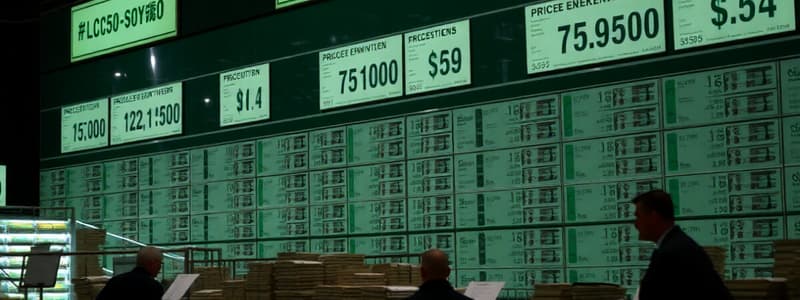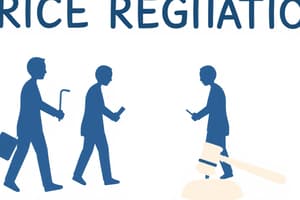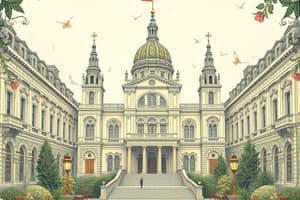Podcast
Questions and Answers
What is another term for price legislation?
What is another term for price legislation?
- Price monitoring
- Price adjustment
- Price control (correct)
- Price regulation
What is the purpose of minimum price control policy?
What is the purpose of minimum price control policy?
To protect producers, especially agricultural producers.
What does maximum price control policy prevent?
What does maximum price control policy prevent?
It prevents selling goods and services above a certain price.
The _______ price control policy is the lowest price allowed by law.
The _______ price control policy is the lowest price allowed by law.
Which of the following is NOT an objective of price control policy?
Which of the following is NOT an objective of price control policy?
One effect of price control policy is that it leads to _______.
One effect of price control policy is that it leads to _______.
List two effects of price control policy.
List two effects of price control policy.
Flashcards
Price Legislation
Price Legislation
Government regulation of prices for essential goods to prevent exploitation or stabilize the economy.
Minimum Price Control
Minimum Price Control
A policy that sets a minimum price for a product, primarily to protect producers and ensure they receive a fair income.
Maximum Price Control
Maximum Price Control
A policy that establishes a maximum price for a good or service, preventing sellers from exceeding the set limit and protecting consumers from price gouging.
Hoarding
Hoarding
Signup and view all the flashcards
Parallel Market
Parallel Market
Signup and view all the flashcards
Excess Demand
Excess Demand
Signup and view all the flashcards
Rationing
Rationing
Signup and view all the flashcards
Study Notes
Price Legislation
- The government can regulate the price of essential commodities, known as price legislation or price control.
- Minimum Price Control Policy: Sets a minimum price for commodities, primarily to protect producers, especially farmers.
- This can involve measures like increasing taxes on competing goods, reducing taxes for producers, or withdrawing subsidies.
- Maximum Price Control Policy: Sets a maximum price for goods and services, preventing sellers from exceeding the stipulated price. This policy aims to protect consumers from exploitation.
Objectives of Price Control Policy
- Prevent exploitation: Ensures fair prices for consumers and prevents sellers from charging excessive prices.
- Control inflation: Curbs rising prices by limiting price increases.
- Help low-income earners: Provides affordability for essential goods for those with limited financial resources.
- Control profits of monopolists: Limits large profits earned by companies with dominant market positions.
- Stabilize income for producers (farmers): Guarantees a minimum income for farmers, enhancing their financial security.
- Accumulate surplus for the government: The government can collect revenue through taxes or price differences.
- Prevent price fluctuation: Aims to maintain consistent prices, reducing market instability.
Effects of Price Control Policy
- Hoarding: Producers may stockpile goods to sell at higher prices later or in the black market.
- Parallel market: Informal markets emerge where goods are sold at prices above the controlled rate, leading to a dual pricing system.
- Excess demand: Price controls can create a demand exceeding supply, leading to shortages.
- Rationing: Distributing goods in limited quantities due to shortages.
- Preferential treatment: Certain individuals or groups may receive preferential access to goods due to influence or connections.
- Queues: People wait in line due to limited supply and high demand.
Nigerian PMS Price Regulation
- The Nigerian government has implemented price controls on Premium Motor Spirit (PMS), commonly known as petrol.
- The consequences of such regulations are complex and wide-ranging.
- Possible consequences:
- Shortages, long queues at filling stations
- Fuel hoarding
- Development of black markets with higher prices
- Increased government intervention in the fuel sector
- Potential for corruption and inefficiency
Studying That Suits You
Use AI to generate personalized quizzes and flashcards to suit your learning preferences.




